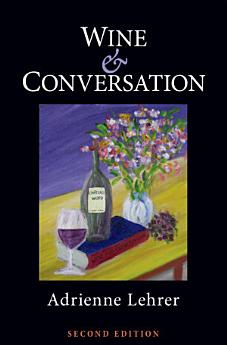Wine and Conversation: Edition 2
Nis 2009 · Oxford University Press
E-kitap
336
Sayfa
family_home
Uygun
info
reportPuanlar ve yorumlar doğrulanmaz Daha Fazla Bilgi
Bu e-kitap hakkında
The vocabulary of wine is large and exceptionally vibrant -- from straight-forward descriptive words like "sweet" and "fragrant", colorful metaphors like "ostentatious" and "brash", to the more technical lexicon of biochemistry. The world of wine vocabulary is growing alongside the current popularity of wine itself, particularly as new words are employed by professional wine writers, who not only want to write interesting prose, but avoid repetition and cliché. The question is, what do these words mean? Can they actually reflect the objective characteristics of wine, and can two drinkers really use and understand these words in the same way? In this second edition of Wine and Conversation, linguist Adrienne Lehrer explores whether or not wine drinkers (both novices and experts) can in fact understand wine words in the same way. Her conclusion, based on experimental results, is no. Even though experts do somewhat better than novices in some experiments, they tend to do well only on wines on which they are carefully trained and/or with which they are very familiar. Does this mean that the elaborate language we use to describe wine is essentially a charade? Lehrer shows that although scientific wine writing requires a precise and shared use of language, drinking wine and talking about it in casual, informal setting with friends is different, and the conversational goals include social bonding as well as communicating information about the wine. Lehrer also shows how language innovation and language play, clearly seen in the names of new wines and wineries, as well as wine descriptors, is yet another influence on the burgeoning and sometimes whimsical world of wine vocabulary.
Yazar hakkında
Adrienne Lehrer is Professor of Linguistics (Emerita), University of Arizona. Lehrer has written on many aspects of lexical semantics: the structures of vocabularies and how words in a language are semantically related to one another. She has used wine descriptors and cooking words to test semantic theories. Recent woek has focused on creative neologisms, especially blends and the meaning of affixes.
Bu e-kitaba puan verin
Düşüncelerinizi bizimle paylaşın.
Okuma bilgileri
Akıllı telefonlar ve tabletler
Android ve iPad/iPhone için Google Play Kitaplar uygulamasını yükleyin. Bu uygulama, hesabınızla otomatik olarak senkronize olur ve nerede olursanız olun çevrimiçi veya çevrimdışı olarak okumanıza olanak sağlar.
Dizüstü bilgisayarlar ve masaüstü bilgisayarlar
Bilgisayarınızın web tarayıcısını kullanarak Google Play'de satın alınan sesli kitapları dinleyebilirsiniz.
e-Okuyucular ve diğer cihazlar
Kobo eReader gibi e-mürekkep cihazlarında okumak için dosyayı indirip cihazınıza aktarmanız gerekir. Dosyaları desteklenen e-kitap okuyuculara aktarmak için lütfen ayrıntılı Yardım Merkezi talimatlarını uygulayın.





